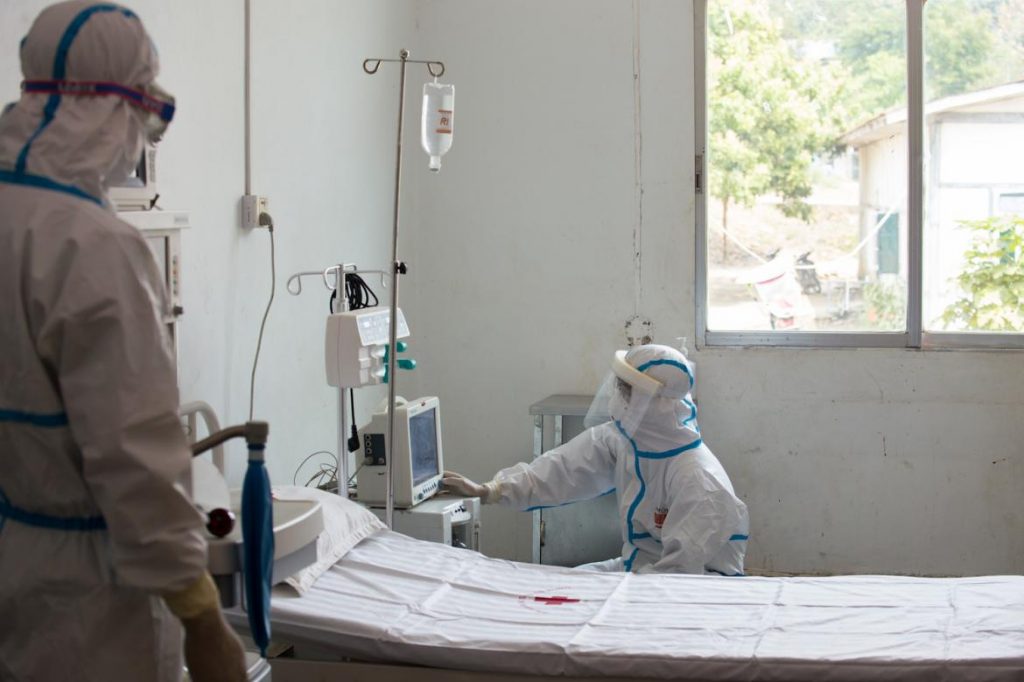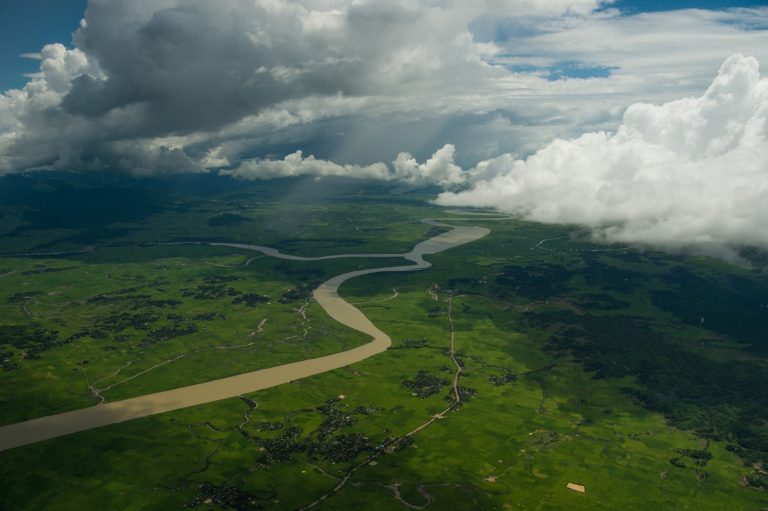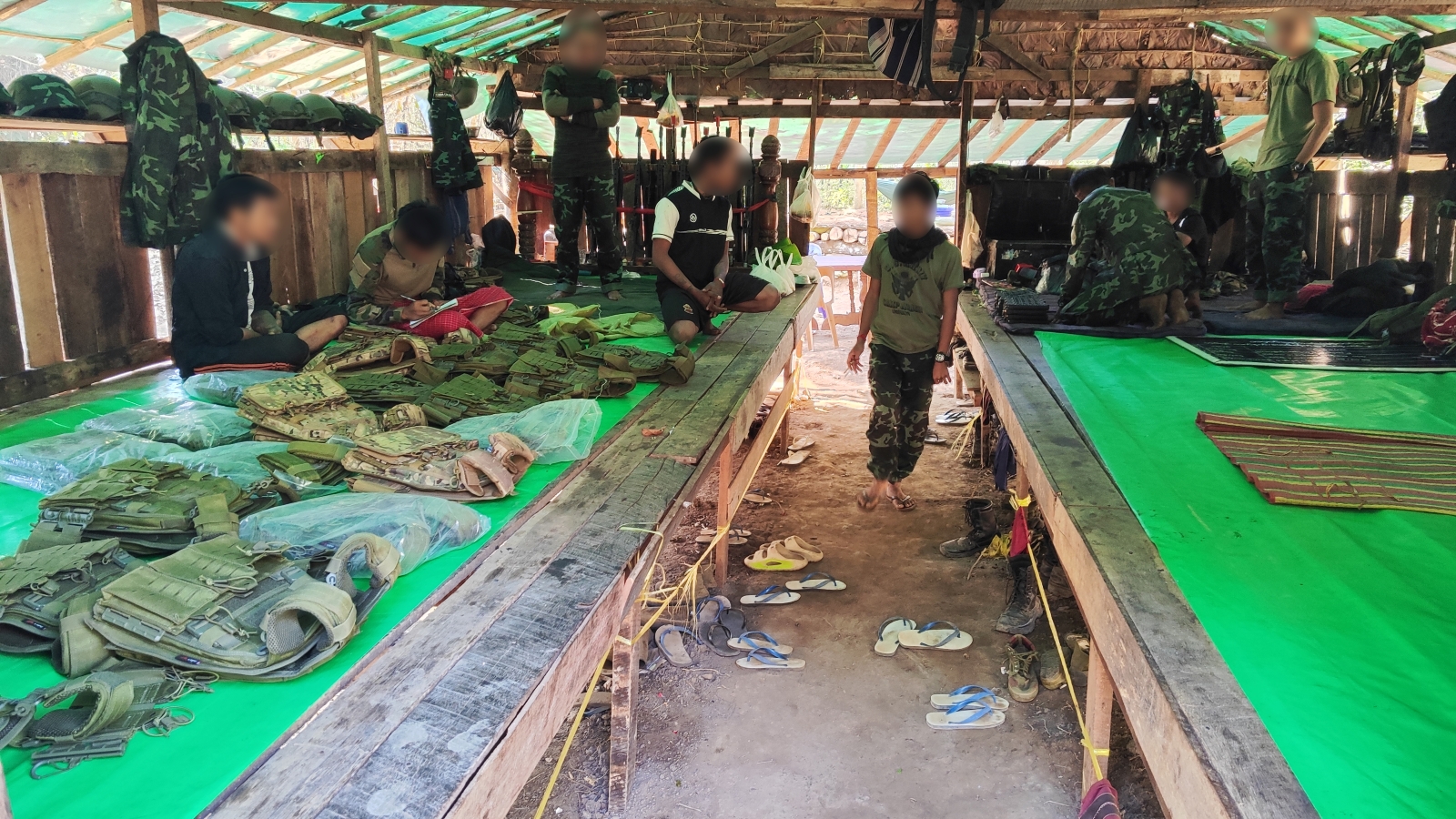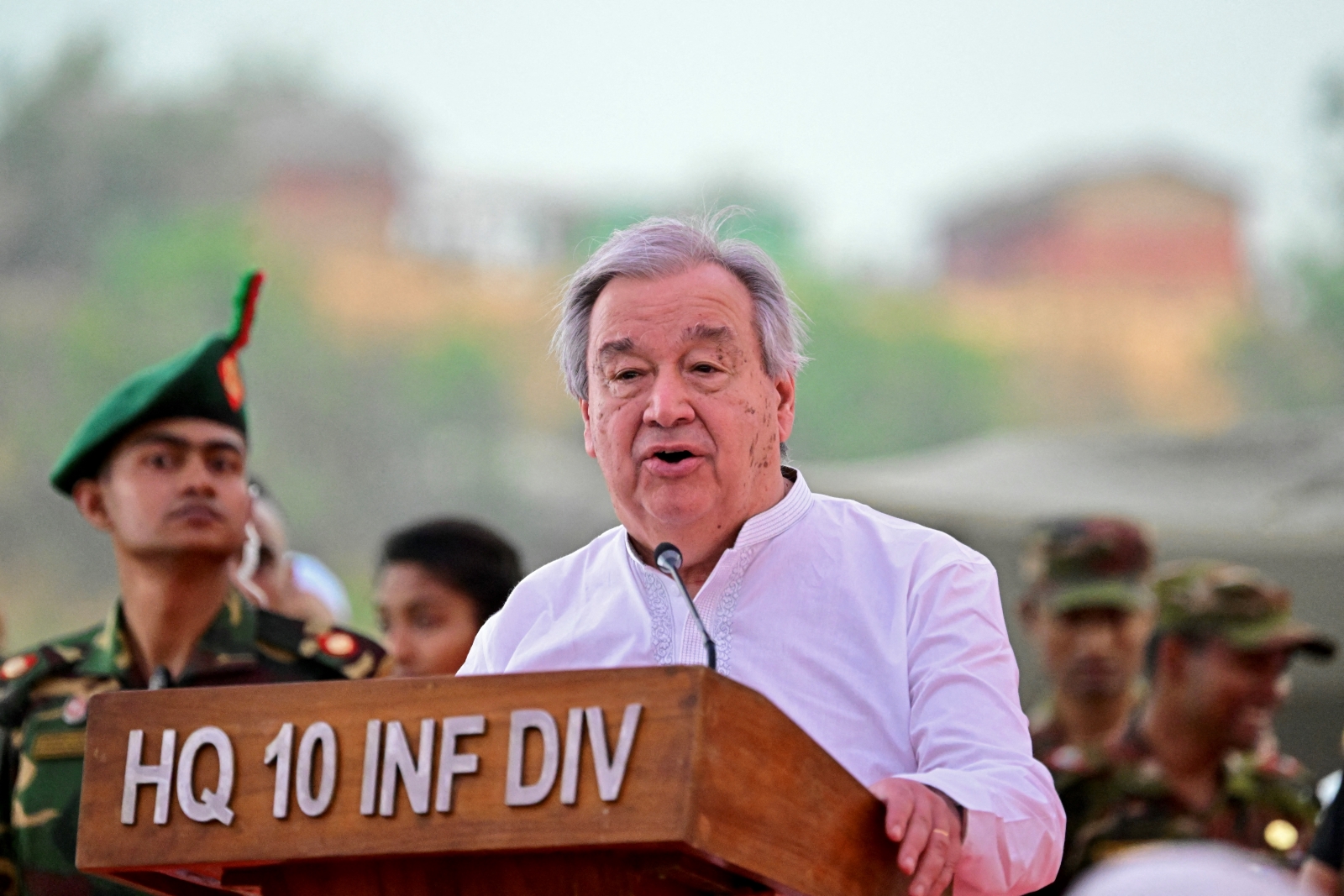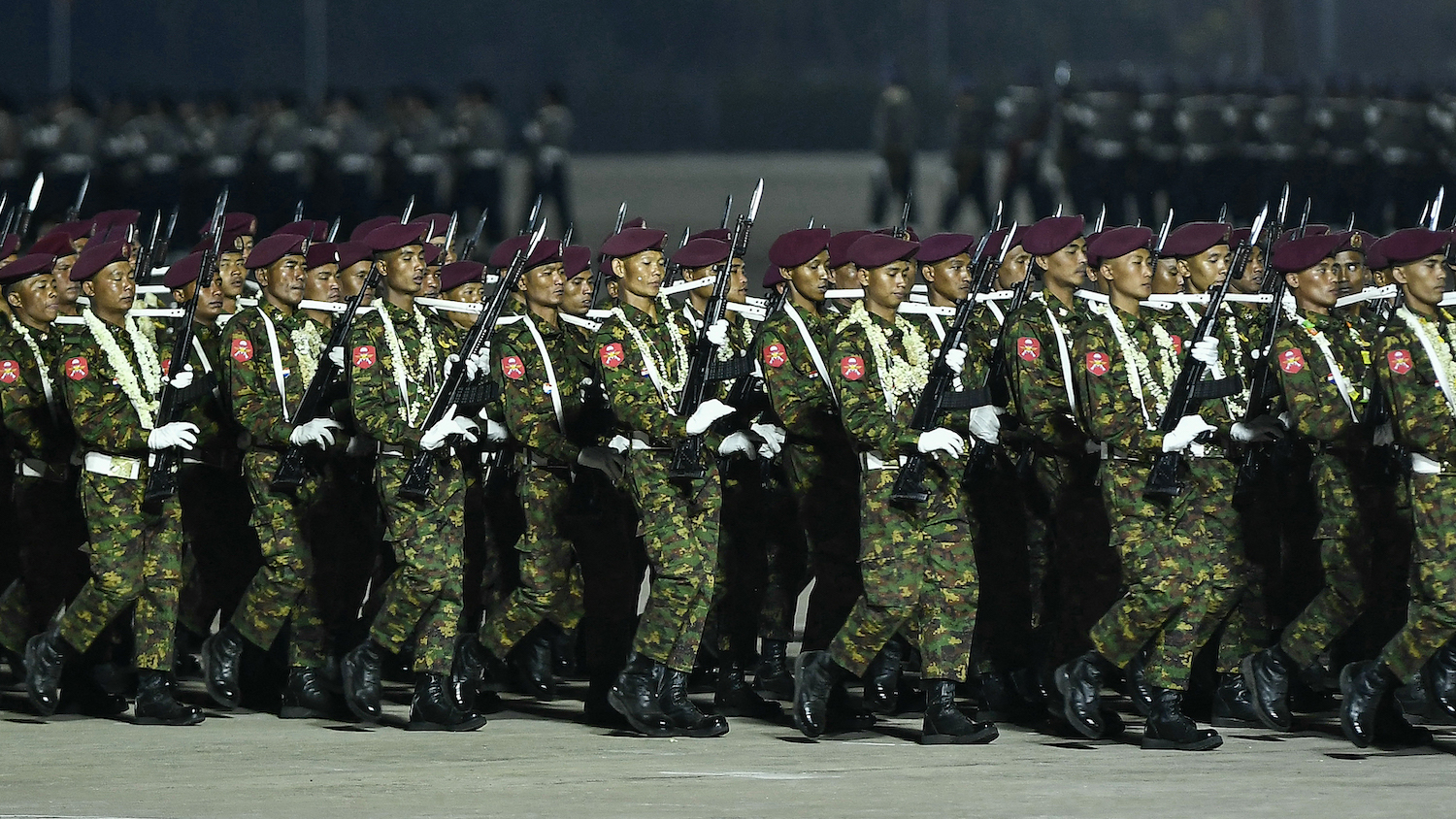Ethnic armed groups are defending their lands and people from COVID-19 with varying levels of capability, while the Tatmadaw refuses to heed calls for a national ceasefire.
By KYAW LIN HTOON | FRONTIER
AS THE government battles to bring the COVID-19 emergency under control, ethnic armed groups are also focussing attention on confronting the threat posed by the virus.
From the Kachin Independence Organisation in the far north to the Karen National Union in the southeast, ethnic armed groups have been mobilising to fight the new, potentially lethal but unseen enemy.
The threat posed by the virus has been especially worrying for the many armed groups based along or near the country’s border with China, where the coronavirus began late last year at a wild animal market in Wuhan, or the border with Thailand, where the first confirmed case outside China was confirmed in mid-January, in a tourist from Wuhan.
Ethnic armed groups have largely been left to manage their own responses on the territory they control, which often include border crossings where significant numbers of people travel in both directions. The way each group has responded to the COVID-19 threat has differed significantly, depending on its resources and capacity, the level of conflict in its area, and the demographics of its communities.
Support independent journalism in Myanmar. Sign up to be a Frontier member.
“We haven’t discussed COVID-19 with them [ethnic armed groups] and we haven’t taken any preventative measures in direct collaboration with ethnic armed groups,” said Tatmadaw spokesperson Brigadier General Zaw Min Tun.
Despite the lack of collaboration, Zaw Min Tun told Frontier on April 10 that the Tatmadaw was encouraged by the positive action taken by ethnic armed groups against the pandemic. “COVID-19 concerns the whole nation. Therefore, we need to fight against it together,” he said.
The Tatmadaw may want to fight the coronavirus “together” with ethnic armies, but it has spurned calls from the KNU, the Restoration Council of Shan State, the Chin National Front and the Karenni National Progressive Party – as well as dozens of civil society groups – for an unconditional national ceasefire to enable all armed organisations to focus their efforts on preventing the spread of the virus.
The RCSS added its voice to the joint demand in a March 27 statement. “At a time when efforts are being made to implement the peace process and solve political issues through political means, it’s necessary to stop fighting nationwide and together make concerted efforts to protect, contain and cure the COVID-19 pandemic,” the group said.
“We respect their proposal but it is not realistic,” Zaw Min Tun told a news conference on April 1, adding that the Tatmadaw had declared a unilateral ceasefire in some parts of the country for nine months last year but fighting had continued.
The calls for a ceasefire came after the United Nations secretary-general, Mr Antonio Guterres, appealed to warring parties throughout the world to lay down their weapons in support of the bigger battle against COVID-19.
“The fury of the virus illustrates the folly of war,” Guterres said on March 23. “That is why today, I am calling for an immediate global ceasefire in all corners of the world. It is time to put armed conflict on lockdown and focus together on the true fight of our lives.”
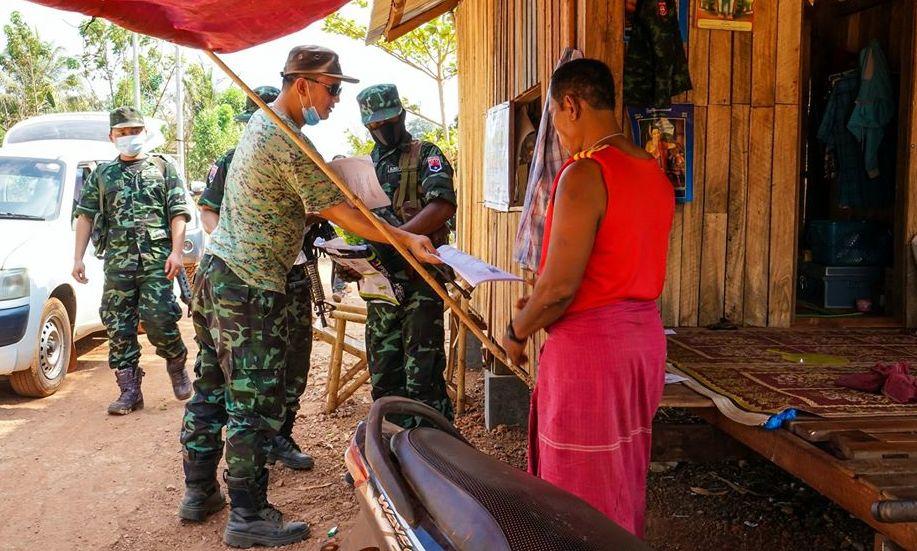
Members of the Karen National Liberation Army, the armed wing of the Karen National Union, hand out information about COVID-19 as part of the group’s prevention measures. (Supplied)
NCA signatories mobilise
The KNU, whose territory is ranged along Myanmar’s long southeastern border with Thailand, says preventing the spread of the pandemic is an urgent national security issue. In a March 26 statement, the KNU said its Department of Health and Welfare has sent instructions for preventative measures based on World Health Organization guidelines to all townships under its control, as well as its armed units.
In its call for an unconditional ceasefire, the KNU had urged the government to work together with the KDHW under the terms of the Nationwide Ceasefire Agreement. A clause in chapter six of the NCA – which the KNU, CNF and six other groups signed in 2015, and were joined by the New Mon State Party and the Lahu Democratic Union in 2018 – commits the signatories, including the government, to cooperate on “projects concerning the health, education and socio-economic development of civilians”.
The KDHW operates four foreign-funded hospitals in separate townships, as well as village tract health centres. The department’s supplies would be quickly overwhelmed in the event of a coronavirus outbreak.
The KNU had a few COVID-19 test kits before the first confirmed cases were reported in Myanmar on March 23 but they were all used to check returnees from Thailand, said Saw Diamond Khin, the head of the KDHW, who said they would refer suspected cases to government hospitals.
“Since February we have decided to hand over to the government any patient we find with COVID-19 symptoms,” he told Frontier.
The KNU’s preventative measures include establishing 49 screening points in the seven districts under its control. Each of these health checkpoints has been supplied with WHO-recommended health packages that included temperature testers, gloves, face masks, high-quality hand gel and more.
“Most of the support we have received came from INGOs, and we appropriated more than four million baht (K173 million) as a preliminary budget to fight against the pandemic,” said Diamond Khin.
KNU central executive committee member Padoh Mahn Nyein Maung said the group had cancelled all of its regular events and meetings to prevent the spread of infection.
In its response to coronavirus, NCA signatory the RCSS and its armed wing, the Shan State Army-South, has gone further by imposing travel restrictions in areas under its control since March 21. It is also conducting temperature checks and distributing masks and hand gel at the entrances to villages and townships, as well as border crossings.
The RCSS, which is headquartered on the Thai-Myanmar border in Loi Tai Leng but is active across Shan State, has established COVID-19 response committees at the village tract level with the assistance of civil society groups and government health department officials.
“The committees manage returnees, whether internal or from Thailand or China, to ensure they undergo a 14-day quarantine in tents erected at the entrances to villages, or in schools or monasteries,” RCSS spokesperson Lieutenant-Colonel Sai Aom Khur told Frontier on April 8. “We allow them to go home only when we are certain they have no coronavirus symptoms.”
The RCSS says it receives no foreign aid and relies on organisational funds and domestic donors. However, it says that medical equipment is in short supply.
“We have found it difficult to manage the response, which ranges from erecting tents for quarantine and feeding the returnees for 14 days to buying medical equipment,” Aom Khur said. “However, there are more donors nowadays, including KBZ which contributed to our COVID-19 effort a few days ago.”
He said though that the biggest challenge was managing the impact of COVID-19 prevention measures on people’s livelihoods.
“Most people are facing financial hardship because they don’t have a job and cannot look for work while they are either in quarantine or restricted from travelling,” Aom Khur said.
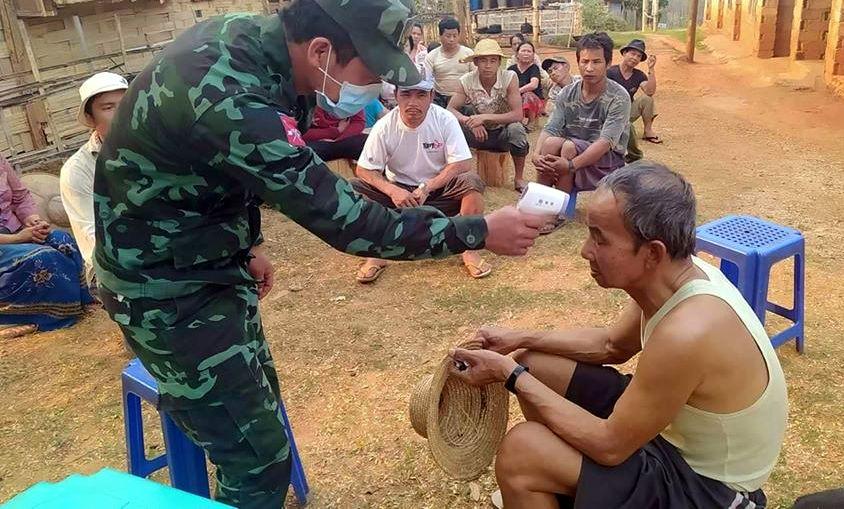
A soldier from the Shan State Army-South, armed wing of the Restoration Council of Shan State, checks a person for fever, one of the symptoms of COVID-19. (Supplied)
Prevention, peace and conflict
The COVID-19 pandemic swept the globe as the NCA signatories and the government were ramping up peace talks that were stalled for more than a year. The aim was to hold the next 21st Century Panglong Union Peace Conference before the general election, which is expected to take place in November.
Originally scheduled for April or May, negotiators now hope to hold a Panglong conference in July or August. However, the uncertainty over how COVID-19 will affect Myanmar means even those dates are far from locked in.
Formal face-to-face talks have recently been suspended and Mahn Nyein Maung said the KNU would not resume dialogue and other peace process meetings until after the threat posed by COVID-19 had passed.
He acknowledged that the cancellation of the meetings would disrupt the peace process, but said the health threat posed by COVID-19 was too urgent to ignore.
The grouping of 10 ethnic armed groups that have signed the NCA has also had to postpone its monthly gatherings and other events.
When it needs to talk, the group is holding video conferences, as it did on April 3 to discuss the framework for continuing the implementation of the NCA. Leaders at the meeting also discussed measures for preventing and containing COVID-19.
“Since our work is based on gatherings and meetings, now is quite a difficult time,” said Salai Aung Myint, director of the NCA-Signatory Ethnic Armed Organisation office. “However, we are doing our best to ensure that the peace process continues.”
Meanwhile, signatory armed groups say that efforts to both pursue the peace process and fight COVID-19 are being frustrated by Tatmadaw incursions into their territory.
Aom Khur accused the Tatmadaw of provoking a clash with the RCSS in Mongton Township on March 25, in which a Tatmadaw private was killed.
“A Tatmadaw unit suddenly walked into villages in an area under our control without prior notice. A conflict was unavoidable; we had to open fire on them,” he said, adding that there should not be fighting while the country deals with the coronavirus outbreak.
“While the pandemic keeps spreading, the peace process has to be put on hold. However, at this time we can all still prepare ourselves for when it resumes and, in the meantime, the Tatmadaw should stick to the terms of the NCA.”
The Tatmadaw though has denied launching offensives anywhere in the country except Rakhine State, where it is locked in an intense conflict with the Arakan Army.
“Nowadays, there are almost no clashes anywhere in the country except Rakhine State. There might be the occasional shooting at each other in some places, but these are not even important enough to be reported by the media or other observer groups,” said the Tatmadaw’s Zaw Min Tun.
A consequence of the fighting for the long-suffering residents of Rakhine is that the state’s COVID-19 prevention and control measures lag far behind those of other states and regions.
U Zaw Zaw Htun, secretary of the Rakhine Ethnics Congress, a civil society group, told Frontier he felt sad that the state was not better prepared for the coronavirus. He made the comment on April 10, the day that two REC members were hospitalised following a road accident on the way to villages in Kyauktaw Township, where they were going to provide education on COVID-19 and distribute face masks and hand gel.
Zaw Zaw Tun said there were rumours that the AA had been warning villagers to follow guidelines issued by the government health department aimed at preventing the spread of the virus. “That’s all I have heard, but it may be conducting other activities,” he said.
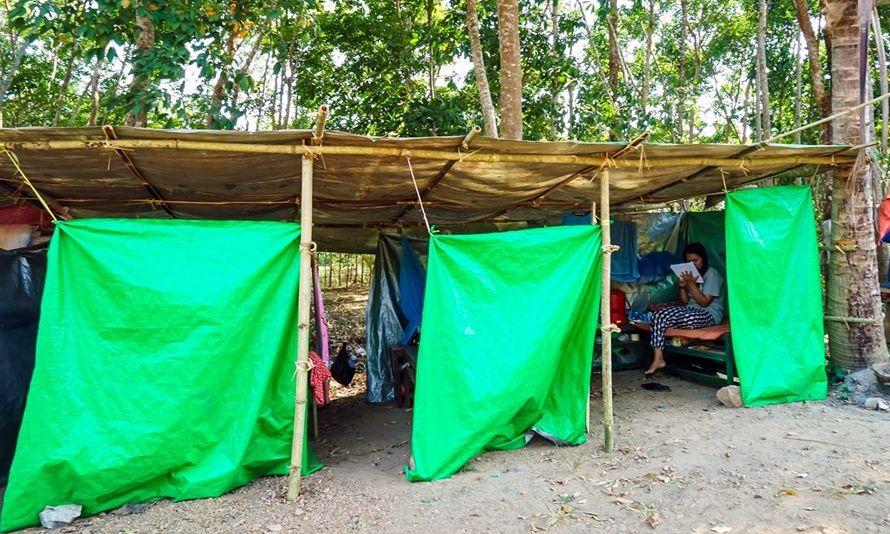
The Karen National Union has set up quarantine huts in its territory for migrants who return from abroad. (Supplied)
Frontier was unable to contact the AA directly because the government has recently designated the group a terrorist organisation and an unlawful association. On March 23, a military spokesman warned that anyone, including residents of Rakhine State and journalists, would face prosecution if they communicated with the group. In late March, police arrested journalists from several media organisations that had recently published interviews with the AA on charges under the Counter-Terrorism Law that carry a potential life sentence.
Zaw Zaw Tun said the REC is aware of about 45 villages that have set up quarantine facilities to house recent returnees from abroad, but REC members had observed many breaches of the quarantine. He attributed this to lack of education and said it underlined why awareness raising activities were so important.
“For example, before finishing the 14-day quarantine, villagers might join the returnees to drink liquor, or a returnee might walk through the village and have lunch with relatives,” he said.
The task of providing information to anxious residents of conflict-affected Rakhine has been complicated by a mobile internet blackout imposed by the government that affects eight townships, and another in neighbouring Chin State.
The REC also estimates that nearly 130,000 people are living in camps for internally displaced persons due to the conflict, although the United Nations gives a far lower figure. The virus would spread quickly in these camps, where people live in close quarters in often squalid conditions, and would probably inflict a high death toll, given that many camp residents are weakened by trauma, other illnesses and the lack of nutritious food.
“[People living in nine townships] have no internet access, and there are also thousands of people in camps that can be hit by artillery shells at any time,” Zaw Zaw Htun said. “We are trying as hard as we can to help them prepare, but if there was an outbreak, in a camp for example, it would be a very big problem.”
The AA’s close ally in the Northern Alliance, the Ta’ang National Liberation Army, based in northern Shan State, has also not signed the NCA and has engaged in fierce fighting with the Tatmadaw in recent years. However, similar to NCA-signatory the KNU, it has decided to hand over any patient with COVID-19 symptoms to the government health department. The group says this is because it lacks the resources to treat coronavirus patients itself.
“In this stage of our revolution we are under-resourced and we have no hospital,” said Major Mai Aik Kyaw, the TNLA spokesperson.
He added that the group had still taken some precautionary measures, including imposing travel restrictions and conducting basic health checks – such as measuring the body temperature – to identify suspected COVID-19 cases.
“If someone is suspected of having COVID-19 we will hand them over to the township health department,” he said.
In northeastern Shan State, the country’s largest non-state armed group, the United Wa State Army, reportedly shut all its border checkpoints with China on March 26. The UWSA, which also has not signed the NCA, said it the shutdown was temporary and when conditions improve the border would reopen. For the time being, the group is focusing on health education and prevention to combat COVID-19, it said.
The neighbouring National Democratic Alliance Army, which also shares a border with China in eastern Shan State, has said it began taking preventative areas in its territory around Mong La in January, shortly after China reported the viral outbreak.
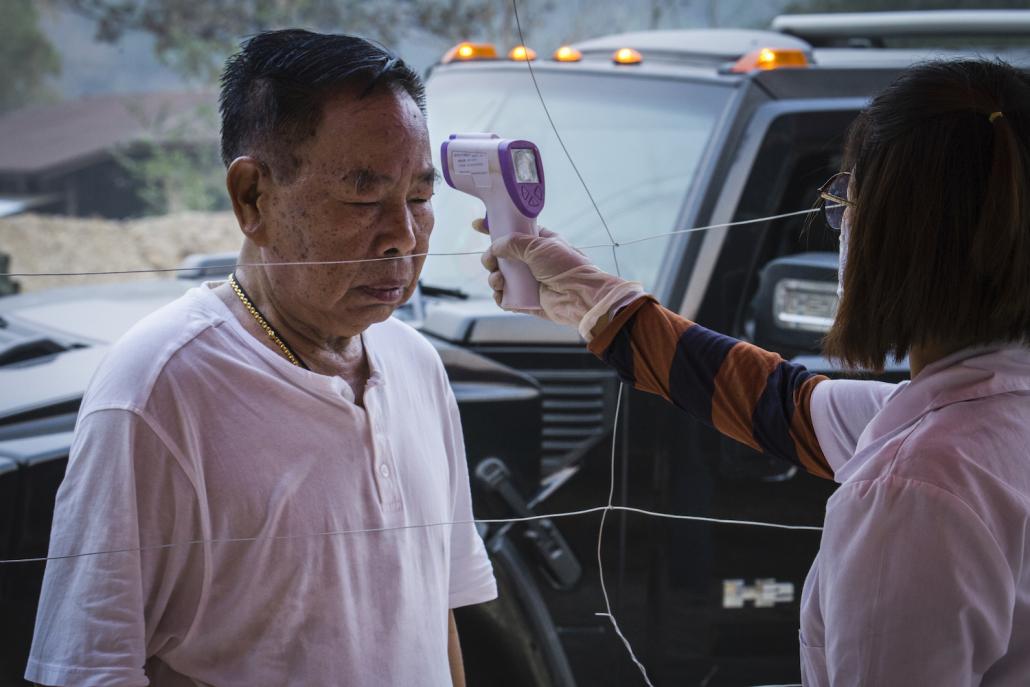
Kachin Independence Organisation leader General N’Ban La has his temperature checked at the entrance to Laiza, the group’s headquarters on the Myanmar-China border, on March 31. (Naw Seng I Frontier)
Overlapping areas
Activists in Kachin State say they are impressed by the KIO’s reaction to the pandemic, which has included establishing a COVID-19 Response Committee in mid-March at its headquarters at Laiza, on the border with China.
Among the committee’s members is Khon Ja, a former member of the Kachin Peace Network. “I am focusing on the safety of health workers in the KIO’s Health Department as well as trying to reach remote areas to introduce preventative measures,” she told Frontier.
Of particular concern in Kachin are the tens of thousands of people displaced by conflict between the KIO and Tatmadaw and living in camps.
“There are more than 70,000 IDPs in our state; some are in camps in KIO areas, some are in areas under government control and some are in overlapping areas,” Khon Ja said. “Efforts are being made to ensure they are all well prepared against the virus.”
Reverend Hkalam Samson, the president of the Kachin Baptist Convention, said no problems had been encountered while providing help in the areas of mixed control.
“The KBC is helping in all areas,” he said. “We are also trying to reach areas like Sumprabum and Tanai, which can also be accessed by the government or the KIO.”
As of the third week of March, the KIO’s COVID-19 Response Committee had distributed 400 sets of personal protective equipment (PPE) and 100,000 face masks for use by medical personal at the group’s hospitals at Laiza and Mai Ja Yang, a KIO-controlled town that is also on the Chinese border.
Asked about assistance from China, Colonel Dr Hing Wawm, who heads the KIO’s Health Department, said some Chinese medical specialists and doctors were in Laiza to help its COVID-19 effort.
Hing Wawm said Chinese medical teams had assisted the KIO in the past when there were outbreaks of infectious diseases, to help make sure that both sides of the border were safe. However, because COVID-19 was more hazardous than other diseases, the KIO had been receiving more assistance from China in the form of equipment and medicine.
Hing Wawm stressed that the Chinese medical personnel in Laiza were not there to treat patients. “However, we have not found any patients yet and if we do it would be difficult to hand them over to the government,” he said. “We would try to treat them in our own facilities, with our own equipment and health staff.”
Nonetheless, he was confident that in the event of a serious outbreak of COVID-19 in KIO territory, China would ramp up its assistance. The KIO would also seek foreign aid from other countries, he said.
The KIO, which has its own laboratory at the hospital in Laiza, is also working closely with the contagious disease control committee in China’s neighbouring Yunnan Province. Hing Wawm said the lab in Laiza could check for COVID-19, but it would also seek to confirm test results using laboratories in Yunnan.
Hing Wawm was speaking prior to April 13, when the KIO announced it had quarantined one suspected COVID-19 case in Laiza. However, the patient tested negative in a laboratory across the border in Yunnan’s Yingjiang County, according to Kachin News Group.
Khon Ja said the KIO’s preparations for the pandemic compared favourably with some parts of the government healthcare sector. As an example, she said the general hospital in Bhamo was under-resourced.
“I’m sure there wouldn’t be enough masks and PPEs if there was an outbreak, so we [Kachin civil society] also intend to support such government hospitals,” she said.
But in Myanmar’s conflict zones, an end to fighting is just as important as testing capacity, protective equipment and quarantine measures.
“We need to be prepared for COVID-19,” she said. “So we’d be grateful if we didn’t have to worry about warfare at this time.”
This article was supported by the X-Border Local Research Network and UK Aid from the UK government. All views expressed are those of Frontier.


